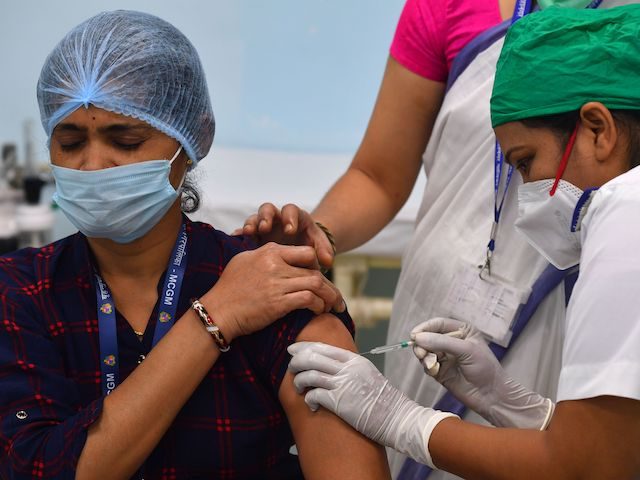Indian Health Minister Ashwini Choubey told the Rajya Sabha, the national legislature’s upper chamber, on Tuesday that an intranasal coronavirus vaccine candidate developed by Bharat Biotech had reached clinical development stages, the Times of India reported.
“The interval period between the two doses is presently 21 days. The schedule will be finalized after the phase I clinical trial data,” Choubey said. “Currently, in phase 1 clinical trial, single dose and two dose schedules are being tested.”
Other coronavirus vaccine candidates — both those in development and those approved for public use — are administered via needles. The Bharat candidate, dubbed BBV154, is delivered as a nasal spray.
The intranasal vaccine candidate is not the only remedy for the pandemic India has championed. Indian Prime Minister Narendra Modi received his first dose of Covaxin, a coronavirus vaccine candidate also developed by Bharat Biotech, on February 28.
The South Asian nation, documenting some of the highest rates of infection and coronavirus-related deaths in the pandemic, has baffled experts the world over with a marked drop in new cases in the past month. Though India experienced nearly 100,000 new cases per day at the pandemic’s height, that figure fell to 11,000 by mid-February. Much of Indian society has returned to normal, with many restaurants and businesses fully open.
While theories abound explaining India’s success in containing the virus, ranging from herd immunity to Indians having stronger immune systems from prior pandemics, the country has also taken exceptional measures to raise awareness about the disease and encourage healthy behavior.
In December 2020, Modi announced India would implement the “world’s largest vaccination program” in 2021.
Worldwide, other nations have developed their own vaccines. The U.S. has approved candidates produced by Pfizer, Moderna, and Johnson & Johnson. Russia approved its own remedy, Sputnik-V, and is aggressively promoting its use, despite lingering concerns over safety and efficacy.
China raised eyebrows with its own “Coronavac,” a Chinese coronavirus vaccine candidate developed by Sinovac Biotech, which clinical trials in Brazil found to be 50.38 percent effective in combating the virus, just over the bare minimum 50 percent threshold the World Health Organization (W.H.O.) has set, but well below the 78 percent efficacy researchers had confidently advertised. Despite Coronavac’s poor performance, Chinese state media trumpeted the vaccine candidate as “good enough.”
A separate vaccine candidate from Chinese firm Sinopharm was found to be 72 percent effective against coronavirus, significantly more effective than Coronavac but still over 20 percent less effective than the U.S.-approved Pfizer and Moderna options.
Dubious efficacy aside, China’s domestically manufactured vaccine candidates are unlikely to play a significant role, if any, in India’s “world’s largest vaccination program” as the two nations remain embroiled in bitter diplomatic and military disputes over border regions in the Himalayas.
India and its government aggressively labored to divest the economy from China in the wake of a series of military standoffs. In June 2020, India blacklisted 59 Chinese apps over security concerns.
Modi’s “Self-Reliant India” campaign encouraging Indians to buy domestic products over Chinese ones reached every level of the economy, with Indians going so far as to hand-make oil lamps for the Hindu festival of Diwali out of cow dung, rather than purchase plastic lamps from China.

COMMENTS
Please let us know if you're having issues with commenting.